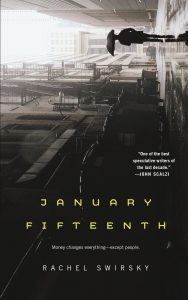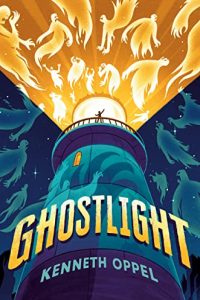Gary K. Wolfe Reviews January Fifteenth by Rachel Swirsky
 January Fifteenth, Rachel Swirsky (Tordotcom 978-1-25019-894-5, $15.99, 240pp, tp) June 2022.
January Fifteenth, Rachel Swirsky (Tordotcom 978-1-25019-894-5, $15.99, 240pp, tp) June 2022.
SF has long had a somewhat fraught relationship with economic policy. On the one hand, it would seem to be an inescapable part of any future society; on the other, it doesn’t easily lend itself to high drama. ‘‘Epic economics’’ isn’t really a thing, despite what Asimov may have thought decades ago. As a result, economics is often treated as the background of a radically transformed future (think of post-scarcity worlds from Doctorow to Banks, or Bacigalupi’s calorie-based economies) or the focus of consumerist satires from Pohl to Stross. This is partly what makes Rachel Swirsky’s novella January Fifteenth so unusual. She begins with a single, simple idea, which is already a topic of serious debate, and traces its effects on a group of characters in a near-future society almost indistinguishable from our own (a reporter might have floating buzzcams and followcams, but the SF invention is for the most part restrained). The policy in question is the establishment of a Universal Basic Income for all citizens, despite their individual levels of wealth, which Swirsky imagines as being distributed annually on January 15 (which seems to be a recipe for chaos, and nearly is, though the rationale for such a once-a-year disbursement is never fully explained).
Swirsky, who has long been a profoundly character-driven author, spends little time depicting the political debates around such a policy or explaining the legislation behind it, but rather focuses on its impact on four diverse characters during a single blizzardy January 15. For Hannah, the UBI has provided the means for her to escape with her two young sons from her violently abusive ex-wife, who continues to stalk the family. Janelle is a freelance reporter tired of repetitive assignments to gather human-interest stories about UBI, but who also takes care of her much younger sister, whose own growing radicalization complicates Janelle’s career. Olivia is a well-to-do college student attending a reunion of high school friends in Aspen, at what turns out to be a decadent ‘‘Waste Day’’ party, celebrating increasingly ridiculous ways to dispose of the UBI checks which none of them really need. Sarah, trapped in an arranged marriage in a cultlike offshoot of the Mormon church, is walking through the Utah rain with her sister-wives in what amounts to a pilgrimage to pick up the checks for the cult’s benefit – though Sarah is haunted by the death of her mother and the memory of how her father brutalized her younger brother Toby. None of these characters are remotely involved in the sorts of political and economic debates that led to the UBI in the first place, though Janelle does make some ominous references to a past event called ‘‘Winter Night,’’ after which the nation experienced ‘‘an extraordinary moment of political will,’’ leading to the UBI. ‘‘We had one sure arrow to fire from that bow,’’ she explains to her sister Nevaeh. ‘‘And whatever we didn’t make sure to fix then, it probably wasn’t going to get fixed for a long time.’’
January Fifteenth comes pretty close to what we might called minimalist SF, in that the major challenges faced by its characters – an abusive spouse, the nihilistic arrogance of rich kids (which culminates in a startling act of violence), the balance of work and family, a repressive religious sect – are not the result of the SFnal novum, but rather are magnified by it. Swirsky’s essential argument – that money doesn’t solve problems, but sometimes might help – is commonplace enough, but that’s hardly the point. In a brief forward, Swirsky says that while she hopes the novella ‘‘is true to the characters and emotions, I can’t claim it’s an accurate prediction.’’ Accurate predictions, as we all know, are actually pretty rare in SF, so that’s hardly the point, either. What is more to the point is that characters as memorable, engaging, and sympathetic as Swirsky’s four women, each seeking ways to survive in systems that don’t really seem to like them much, are almost equally rare. By the time we’re halfway through their tales, we’re engaged enough to want to follow their fates, UBI or no UBI.
Gary K. Wolfe is Emeritus Professor of Humanities at Roosevelt University and a reviewer for Locus magazine since 1991. His reviews have been collected in Soundings (BSFA Award 2006; Hugo nominee), Bearings (Hugo nominee 2011), and Sightings (2011), and his Evaporating Genres: Essays on Fantastic Literature (Wesleyan) received the Locus Award in 2012. Earlier books include The Known and the Unknown: The Iconography of Science Fiction (Eaton Award, 1981), Harlan Ellison: The Edge of Forever (with Ellen Weil, 2002), and David Lindsay (1982). For the Library of America, he edited American Science Fiction: Nine Classic Novels of the 1950s in 2012, with a similar set for the 1960s forthcoming. He has received the Pilgrim Award from the Science Fiction Research Association, the Distinguished Scholarship Award from the International Association for the Fantastic in the Arts, and a Special World Fantasy Award for criticism. His 24-lecture series How Great Science Fiction Works appeared from The Great Courses in 2016. He has received six Hugo nominations, two for his reviews collections and four for The Coode Street Podcast, which he has co-hosted with Jonathan Strahan for more than 300 episodes. He lives in Chicago.
This review and more like it in the June 2022 issue of Locus.
 While you are here, please take a moment to support Locus with a one-time or recurring donation. We rely on reader donations to keep the magazine and site going, and would like to keep the site paywall free, but WE NEED YOUR FINANCIAL SUPPORT to continue quality coverage of the science fiction and fantasy field.
While you are here, please take a moment to support Locus with a one-time or recurring donation. We rely on reader donations to keep the magazine and site going, and would like to keep the site paywall free, but WE NEED YOUR FINANCIAL SUPPORT to continue quality coverage of the science fiction and fantasy field.
©Locus Magazine. Copyrighted material may not be republished without permission of LSFF.








